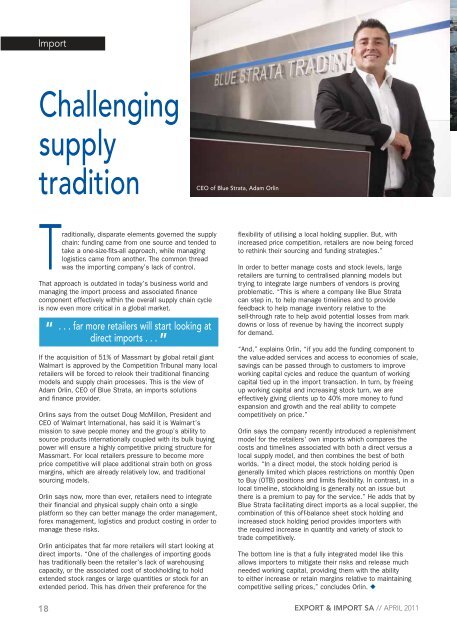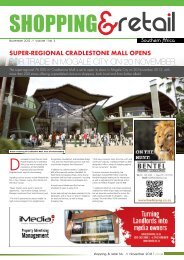April 2011 - Malnor
April 2011 - Malnor
April 2011 - Malnor
Create successful ePaper yourself
Turn your PDF publications into a flip-book with our unique Google optimized e-Paper software.
Import<br />
Challenging<br />
supply<br />
tradition<br />
Traditionally, disparate elements governed the supply<br />
chain: funding came from one source and tended to<br />
take a one-size-fits-all approach, while managing<br />
logistics came from another. The common thread<br />
was the importing company’s lack of control.<br />
That approach is outdated in today’s business world and<br />
managing the import process and associated finance<br />
component effectively within the overall supply chain cycle<br />
is now even more critical in a global market.<br />
“ . . . far more retailers will start looking at<br />
If the acquisition of 51% of Massmart by global retail giant<br />
Walmart is approved by the Competition Tribunal many local<br />
retailers will be forced to relook their traditional financing<br />
models and supply chain processes. This is the view of<br />
Adam Orlin, CEO of Blue Strata, an imports solutions<br />
and finance provider.<br />
Orlins says from the outset Doug McMillon, President and<br />
CEO of Walmart International, has said it is Walmart’s<br />
mission to save people money and the group’s ability to<br />
source products internationally coupled with its bulk buying<br />
power will ensure a highly competitive pricing structure for<br />
Massmart. For local retailers pressure to become more<br />
price competitive will place additional strain both on gross<br />
margins, which are already relatively low, and traditional<br />
sourcing models.<br />
Orlin says now, more than ever, retailers need to integrate<br />
their financial and physical supply chain onto a single<br />
platform so they can better manage the order management,<br />
forex management, logistics and product costing in order to<br />
manage these risks.<br />
Orlin anticipates that far more retailers will start looking at<br />
direct imports. “One of the challenges of importing goods<br />
has traditionally been the retailer’s lack of warehousing<br />
capacity, or the associated cost of stockholding to hold<br />
extended stock ranges or large quantities or stock for an<br />
extended period. This has driven their preference for the<br />
18<br />
direct imports . . . ”<br />
CEO of Blue Strata, Adam Orlin<br />
flexibility of utilising a local holding supplier. But, with<br />
increased price competition, retailers are now being forced<br />
to rethink their sourcing and funding strategies.”<br />
In order to better manage costs and stock levels, large<br />
retailers are turning to centralised planning models but<br />
trying to integrate large numbers of vendors is proving<br />
problematic. “This is where a company like Blue Strata<br />
can step in, to help manage timelines and to provide<br />
feedback to help manage inventory relative to the<br />
sell-through rate to help avoid potential losses from mark<br />
downs or loss of revenue by having the incorrect supply<br />
for demand.<br />
“And,” explains Orlin, “if you add the funding component to<br />
the value-added services and access to economies of scale,<br />
savings can be passed through to customers to improve<br />
working capital cycles and reduce the quantum of working<br />
capital tied up in the import transaction. In turn, by freeing<br />
up working capital and increasing stock turn, we are<br />
effectively giving clients up to 40% more money to fund<br />
expansion and growth and the real ability to compete<br />
competitively on price.”<br />
Orlin says the company recently introduced a replenishment<br />
model for the retailers’ own imports which compares the<br />
costs and timelines associated with both a direct versus a<br />
local supply model, and then combines the best of both<br />
worlds. “In a direct model, the stock holding period is<br />
generally limited which places restrictions on monthly Open<br />
to Buy (OTB) positions and limits flexibility. In contrast, in a<br />
local timeline, stockholding is generally not an issue but<br />
there is a premium to pay for the service.” He adds that by<br />
Blue Strata facilitating direct imports as a local supplier, the<br />
combination of this off-balance sheet stock holding and<br />
increased stock holding period provides importers with<br />
the required increase in quantity and variety of stock to<br />
trade competitively.<br />
The bottom line is that a fully integrated model like this<br />
allows importers to mitigate their risks and release much<br />
needed working capital, providing them with the ability<br />
to either increase or retain margins relative to maintaining<br />
competitive selling prices,” concludes Orlin. ◆<br />
EXPORT & IMPORT SA // APRIL <strong>2011</strong>
















